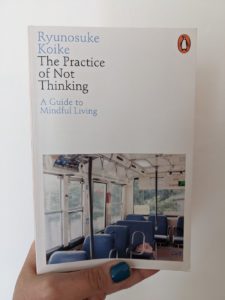The Practice of Not Thinking by Ryunosuke Koike
Written by Ashley Kelmore, Posted in Reviews
Best for:
Anyone looking for a book on mindful living that isn’t primarily about meditating a few times a week.
In a nutshell:
Former Buddhist monk Koike shares his thoughts on ways we can stop thinking (or, I’d argue, stop overthinking, as his suggestions do require a fair bit of though) and ultimately live more peacefully.
Worth quoting:
“[B]egin by being considerate, thinking of our listener, so we don’t cause unnecessary stimulation or stress for the other person.”
“If we’re truly sorry about something, we should think about the best way to ease the burden on the other person rather than merely apologizing or making an excuse for our own comfort.”
Why I chose it:
It caught my eye in a bookstore. Also, my life has recently been a bit stressful, and I was looking for something other than ‘meditate more’ in terms of mindful living.
Review:
CN: Fatphobia
I am ambivalent about this book. There are some aspects of it that I think are insightful, interesting, and helpful; there are some aspects that I find a bit naive and possibly even detrimental if followed. In some of those instances I believe I understand what Koike is getting at, but I’m not sure he’s portraying a very realistic approach to living.
But first, the good. The book opens strongly, laying out what Koike sees as ‘thinking disease.’ He pulls in concepts of Buddhism and suggests that many of the ways we act in life can be seen through the prisms of desire, anger, and uncertainty, and we should seek to limit our experience of these. Throughout the book he does connect many concepts that I might not have associated with one of those three emotions to them, and it’s an interesting concept
The main approach for Koike is is that we must develope our senses, defined as speaking, listening, seeing, reading and writing, eating, discarding, touching, and nurturing. I found the speaking and listing sections to offer the most practical insight. The other sections, while not necessarily bad, just didn’t speak to me as much.
There were parts, however, that did frustrate me. In the writing section he says we shouldn’t ever write anything negative, and only write about things we’ve enjoyed (lol sorry but what). This is an example of how at times he seems so dedicated to the idea of peace that he sees no value in examining or interrogating things that might not be awesome. The section on eating also somehow ended up being an icky little chapter on dieting, and in the section where he discusses relationships (‘nurturing’), the example he uses of a discussion to have is about a wife being upset that her husband is fat. Amazing how fear of fatness works its way into everything, even a philosophy book on mindfulness.
Another part that I found a bit naive was the way he speaks about money, and people wanting to have some. He definitely is talking about the dangers of hoarding money, and references billionaires, but also he seems to ignore the idea that one might need to save some money so one can pay for one’s bills and housing.
As I said up top, there are parts of this I like. I started reading it during the end of my football (soccer) season, and as a goal keeper it can be hard at times to maintain focus when so much action is happening at the other end of the pitch. Some of the tips in here helped me to focus more on the match and my movements in it. I’m also actively working on incorporating some of what he shared in the speaking and listening sections. But I’m not sure I could fully recommend this to others.
Recommend to a Friend / Keep / Donate it / Toss it:
Despite the middling rating, I probably will keep it.

